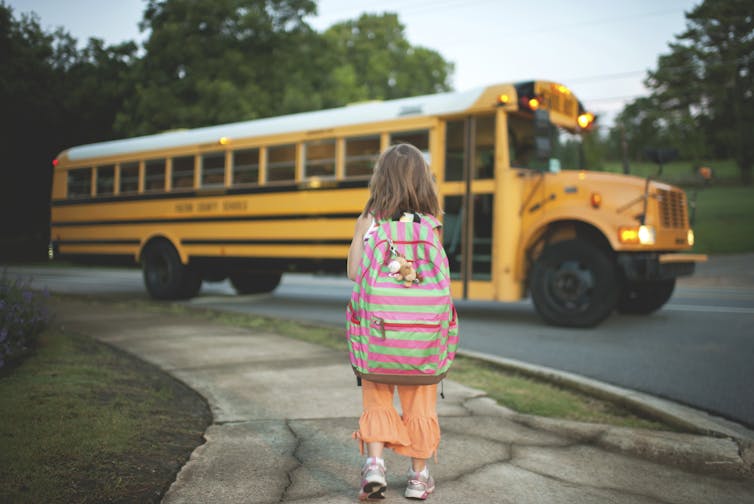Spoiler alert: smacking them upside the head is NOT recommended
Elizabeth Englander, Bridgewater State University
 |
| Predictable routines can help children feel calm and in control. Cavan Images/Cavan Collection via Getty Images |
During pre-pandemic times, researchers noted that as many as 7% of children had a diagnosable anxiety disorder that disrupted their everyday functioning. In addition, 20% had a tendency to feel anxious that didn’t rise to the level of a clinical disorder. And all children feel anxious at some time or another.
Most researchers have found that anxiety in children increased during and after the pandemic. Lockdowns that isolated children from their peers and interruptions to their routines may have accounted for the findings in these studies.
As a researcher who’s studied children’s mental health for decades, I know that predictability helps prevent anxiety in children. Predictability means things going along as they’ve always gone: sleep at night, up in the morning, cornflakes for breakfast, off to school, activities in the afternoon, dinner with the family.
In Louise Fitzhugh’s children’s novel “Harriet the Spy,” Harriet’s mother can’t believe that her daughter always takes a tomato sandwich to school. Always. Harriet has no interest in variety. She’s perfectly happy with the same sandwich, year after year.
Anxiety will crop up for many children again this fall, and it can be intertwined with other feelings, such as excitement and shyness. Here are steps parents can take to help reduce their kids’ back-to-school anxiety and encourage a better start to the fall term.
1. Look for general symptoms of anxiety
Ask your kids how they’re feeling about going back to school, and keep an eye out for headaches, stomachaches, sleeping troubles, persistent “what if” questions, crankiness, excessive concern about very distant events, problems focusing on schoolwork and concerns that aren’t alleviated by logical explanations. An example might be your children worrying that they won’t have friends in school, even though they do have friends from their class last year; or concerns that while they’re at school, something extremely unlikely will happen, such as the house being hit by lightning.
What’s tricky, of course, is that any of these behaviors can be an indication of many different problems, so probe further. Talking to your kids about their thoughts may help you unravel whether they’re feeling anxious.
2. Encourage activities that reduce anxiety
Playing outside, playing with friends or even just “hanging out” can be powerful ways to reduce negative feelings. Outdoors, people often feel more relaxed. Playing in an unstructured way – that is, without someone else telling them what or how to play – allows kids to work through their feelings and reduce anxiety.
3. Limit kids’ screen time
Researchers have found that, post-pandemic, more children are using different types of digital devices, along with more social media apps. The significant body of evidence finding a link between excessive digital device use and anxiety suggests that these increases in device use may contribute to increased anxiety rates in children.
4. Focus on family activities
The emotional connection that children have with their families is their psychological anchor during difficult times. At a time of increased stress and uncertainty, spending time with family can be an antidote. Take a walk or a hike together, eat dinner together, or play board games.
5. Embrace distraction
Distraction isn’t a cure for anxiety, but it can diminish its intensity and help sufferers think more clearly about the source of their worries. When children are feeling very anxious, it’s fine to talk to them about how watching TV or reading a funny book can help them feel calmer.
6. Get professional help when needed
If your child’s anxiety is interfering with sleep, eating, socializing or school attendance, and it persists beyond a few days, it’s a good idea to call your pediatrician or family doctor and report what’s going on. Medical professionals who work with children have seen anxiety skyrocket among kids, and they know how to get your child the necessary help.
As with any back-to-school season, you may find yourself shopping for binders and backpacks. However, children and their anxiety may also need your attention. Practicing simple prevention and intervening when necessary can get your kids off to a great school year.
[The Conversation’s newsletter explains what’s going on with the coronavirus pandemic. Subscribe now.]
This article was updated on July 31, 2023 to replace outdated information.![]()
Elizabeth Englander, Professor of Psychology, Bridgewater State University
This article is republished from The Conversation under a Creative Commons license. Read the original article.